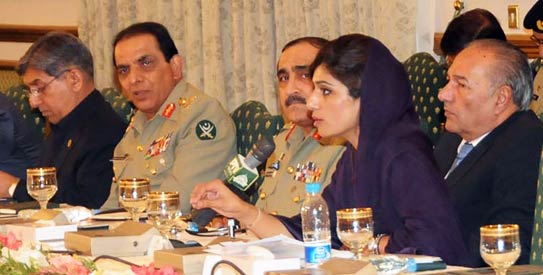Pakistan on Thursday closed ranks against increasing US pressure for action against the Al-Qaeda-linked Haqqani network, refusing to be pressured into doing more in the war on terror.
Prime Minister Yousuf Raza Gilani brought together opposition leaders, members of his fragile coalition and military commanders in a rare “all-party conference (APC)” to forge unity in the latest showdown with Washington.
“The Pakistani nation affirms its full solidarity and support for the armed forces of Pakistan in defeating any threat to national security,” a resolution adopted unanimously after a marathon session said.
The participants were summoned in the wake of stinging rebukes accusing Pakistan of involvement in recent attacks on the US embassy in Kabul and a NATO base in Afghanistan and demands that the government cut ties with the Haqqanis.
“APC rejected the recent assertions and baseless allegations made against Pakistan. Such assertions are without substance and derogatory to a partnership approach,” it said.
Pakistan desires to establish and maintain “friendly and cordial relations with all countries of the world on the basis of sovereign equality, mutual interest and respect,” it said.
The conference “recognized that there has to be a new direction and policy with a focus on peace and reconciliation. ‘Give peace a chance’ must be the guiding central principle henceforth.”
Giving details Information Minister Firdaus Ashiq Awan said Foreign Minister Hina Rabbani Khar and ISI chief Lieutenant General Shuja Pasha on the security environment of the country and the regional situation.
Earlier in his opening remarks prime minister Gilani said: “American statements shocked us, and negate our sacrifices and successes in the ongoing war against terror.”
But he sought to lower tensions with the United States, saying that differences should be resolved through talks.
“We should give up talking about assumptions for the sake of meaningful negotiations. Pakistan cannot be pressurised to do more. Our national interests should be respected. Our doors are open for dialogue,” Gilani said.
The conference resolved that “Pakistan must initiate dialogue with a view to negotiate peace with our own people in the tribal areas and a proper mechanism for this be put in place.
In an apparent conciliatory tone the conference said “the international community needs to recognize tremendous sacrifices as well as the colossal magnitude of destruction” in Pakistan since it joined the US-led “war against terror.”
“We need to further enhance our brotherly bilateral relations with Afghanistan at three levels on priority basis: government to government, institution to institution and people to people,” it said.
Islamabad officially denies any support for Haqqani attacks in Afghanistan, but has nurtured Pashtun warlords for decades as a way of influencing events across the border and offsetting the might of arch-rival India.
US officials want Pakistan to launch an offensive against the Haqqanis, but the military says it is too over-stretched fighting local Taliban to open a new front against a US enemy that does not pose a threat to Pakistan.
Overnight, Washington appeared to tread more carefully on Pakistan, with White House spokesman Jay Carney saying he would not have used the same language as outgoing top US military officer Admiral Mike Mullen, and Clinton saying the countries have to “work together”.
Mullen had accused Pakistan of exporting violent extremism to Afghanistan and called the Haqqani network a “veritable arm” of its Inter-Services Intelligence (ISI) agency.
But Pakistanis are deeply suspicious of US intentions and fearful of unilateral action similar to the raid that killed Osama bin Laden on May 2.
The covert raid humiliated the army, embarrassed the government and brought relations between Pakistan and the United States to their lowest point.
“The conference has sent a positive message to the international community at a difficult time,” political analyst Rasul Bakhsh Rais told private Geo television.
More than 50 delegates attended, including army chief of staff Ashfaq Kayani, considered the most powerful man in Pakistan, opposition leader Nawaz Sharif and heads of Islamic parties such as pro-Taliban cleric Fazlur Rehman.











